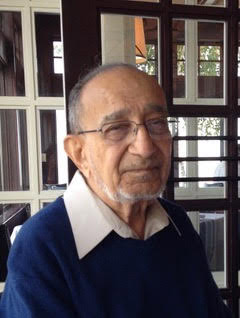
Abbas Husayn Hamdani. Courtesy Sumaiya Hamdani
Abbas Hamdani, historian of the Middle East and Islam, died on December 23, 2019.
Hamdani was born on August 11, 1926, in Surat, India, into a family of religious scholars. He was educated in India, receiving his BA (1945) and LLB (1947) from Bombay University and his PhD (1950) from the School of Oriental and African Studies at the University of London. After teaching in Pakistan from 1951 to 1962 and at the American University in Cairo from 1962 to 1969, he was invited to teach at the University of Wisconsin–Madison in 1969 and then appointed to the faculty in the history department at the University of Wisconsin–Milwaukee (UWM) in 1970. He retired from UWM in 2001 and moved to Florida, where he enjoyed retirement with his wife until her passing. His last years were spent with his daughter and granddaughter in Bethesda, Maryland.
Abbas Hamdani taught Middle East and Islamic history at UWM and published widely in the fields of Islamic history and philosophy, Islamic perspectives on the voyages of New World discovery, and current events as they related to the Middle East and the Islamic world. His publications include The Call to God: An Arabic Critical Edition and English Translation of Epistle 48 (Oxford Univ. Press, 2019), co-translated with Abdallah Soufan; a translation of Tuhfat al-qulub: The Precious Gift of the Hearts and Good Cheer for Those in Distress (Dar-al-Saqi, 2012); The Fatimids: A Short History (1962); and “Columbus and the Recovery of Jerusalem” (Journal of the American Oriental Society, 1979), a foundational work in the field.
Hamdani was instrumental in developing programs in his field and related areas. At UWM he helped to establish and chair committees in Middle East and North African studies and in comparative religions. He also helped found the American Institute of Yemeni Studies and the Middle East Medievalists, and was active in the Middle East Studies Association. He received numerous grants from the Fulbright Foundation, American Research Center in Egypt, and Institute of Ismaili Studies in London. Eager to connect with his home community, he worked to enhance coverage of Middle East history in Wisconsin high schools, participated in interfaith dialogues, and gave talks on Arab-American affairs. His service in all these areas was recognized with Distinguished Service and Teaching Awards at UWM; the Educator of the Year Award and service awards from the Indian Student Association at UWM and Pakistan Cultural Association of Milwaukee; the Distinguished Arab-American Award for Wisconsin by the National Association of Arab Americans; the Distinguished Service Award from the Middle East Medievalists; and the Distinguished Scholar of the Year Award from the Wisconsin Institute of Peace and Conflict Studies. His contribution to interfaith dialogue is addressed in the forthcoming Interfaith Engagement in Milwaukee (Marquette Univ. Press).
A man of charm and impressive erudition, Hamdani was beloved by family, students, colleagues, and fellow scholars, and the many friends he made over a long and eventful life. He was a devoted husband and father, an unflagging support for many family members, an inspiring teacher for legions of students, a willing and generous collaborator for many scholars. Throughout his life, he embraced the causes of justice and the oppressed, which he pursued through active civic engagement and community activism after becoming an American citizen. He was a poet and a lover of music, the beauties of which he imparted to his children. He was a generous and kind man, meticulous in corresponding with all he knew through letters and cards. He was, in short, a man of virtue, erudition, and service to others, and he will be greatly missed.
Hamdani was predeceased by his beloved wife, Zubeda, in 2015 and his daughter Amal in 1994. He is survived by his daughter Sumaiya and grandchildren Ali Hamdani-Shaw, Anisa Hamdani-Shaw Conde, and Zahra Hamdani.
Sumaiya Hamdani
George Mason University
This work is licensed under a Creative Commons Attribution-NonCommercial-NoDerivatives 4.0 International License. Attribution must provide author name, article title, Perspectives on History, date of publication, and a link to this page. This license applies only to the article, not to text or images used here by permission.